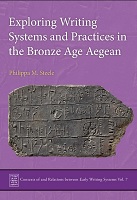Exploring Writing Systems and Practices in the Bronze Age Aegean
Author(s)
Steele, Philippa M.
Collection
Knowledge Unlatched (KU)Language
EnglishAbstract
Writing does not begin and end with the encoding of an idea into a group of symbols. It is practiced by people who have learnt its principles and acquired the tools and skills for doing it, in a particular context that affects what they do and how they do it. Nor are these practices static, as those involved exploit opportunities to adapt old features and develop new ones. The act of writing then has tangible and visible consequences not only for the writers but also for those encountering what has been produced, whether they can read its content or not – with potential for a wider social visibility that can in turn affect the success and longevity of the writing system itself. With a focus on the syllabic systems of the Bronze Age Aegean, this book attempts to bring together different perspectives to create an innovative interdisciplinary outlook on what is involved in writing: from structuralist views of writing as systems of signs with their linguistic values, to archaeological and anthropological approaches to writing as a socially grounded practice. The main chapters focus on the concepts of script adoption and adaptation; different methods of logographic writing; and the vitality of writing traditions, with repercussions for the modern world. Contexts of and Relations between Early Writing Systems (CREWS) is a project funded by the European Research Council under the European Union’s Horizon 2020 research and innovation program (grant agreement No. 677758), and based in the Faculty of Classics, University of Cambridge.
Keywords
Language Arts & Disciplines; Alphabets & Writing Systems; Social Science; Archaeology; History; Europe; GreeceISBN
9781789259018, 9781789259025Publisher
Oxbow BooksPublisher website
https://www.oxbowbooks.com/oxbow/Publication date and place
2023Imprint
Oxbow BooksClassification
Writing systems, alphabets
Archaeology
European history


 Download
Download